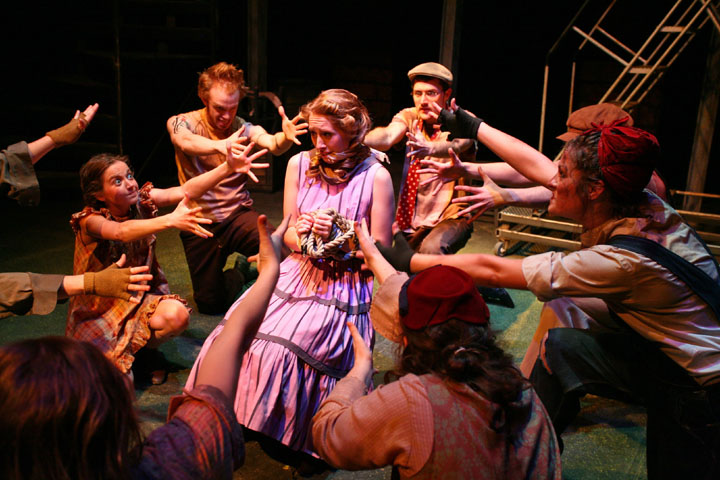
 It’s that time of year for high school seniors interested in theatre who are looking to find the right college. College application time! If you are a high school student interested in the theatre or a drama teacher or guidance counselor who works with students looking to make the next step, you are most likely in need of some guidance. Here is a quick checklist of some things to consider when looking for that college where you will study one or more of the theatre arts, such as acting, music theatre performance, theatrical design/tech, and dramatic writing.
It’s that time of year for high school seniors interested in theatre who are looking to find the right college. College application time! If you are a high school student interested in the theatre or a drama teacher or guidance counselor who works with students looking to make the next step, you are most likely in need of some guidance. Here is a quick checklist of some things to consider when looking for that college where you will study one or more of the theatre arts, such as acting, music theatre performance, theatrical design/tech, and dramatic writing.
B.F.A. or B.A.?
If you’re going to an institution of higher education for theatre, there are two basic undergraduate degrees. One is a B.F.A. (Bachelor of Fine Arts) and the other is a B.A. (Bachelor of Arts). There are a few basic distinctions between the two.
B.F.A.
- One primary focus- Acting, Design, Playwriting, etc.
- Most courses are in theatre
- A few general education requirements
- Often there’s a focus on lab and production work
B.A.
- Often has a more general overview of theatre at first
- More of a focus after a year or so
- There are more general education requirements
- Often has a foreign language requirement
- Focus on production work, often less lab time
The above distinctions are generalized. The main thing to remember is that neither type of degree is necessarily better than the other. The B.F.A. gives you more of a specific focus, while the B.A. allows you to sample more experiences and perhaps find areas of interest of which you had not previously thought.
Location and Size
 In some ways this is simple- do you want to be in a big city or a small town? Again, neither is better than the other. Base your choice on your comfort level. If you find a large city to be overwhelming, that can be an issue and, likewise, if you think a small town will be uninteresting, that can impact you negatively also.
In some ways this is simple- do you want to be in a big city or a small town? Again, neither is better than the other. Base your choice on your comfort level. If you find a large city to be overwhelming, that can be an issue and, likewise, if you think a small town will be uninteresting, that can impact you negatively also.
Size is more of a concern for many. Large schools with big names are great to go to if you’re going to get enough opportunity to grow. Many times students find that they get lost in an incoming theatre class of 100 or so and actors, designers, and others never get a shot at major productions. A small school that has fewer majors may offer you more opportunity to work on shows and also to get involved in more than one area of the theatre.
Audition/Interview
 At many schools, you can simply declare a theatre major without an audition or an interview. Others you must audition and at some you must both audition and interview. A school that is willing to give you both an audition and an interview is one to consider. It means they are interested in finding good majors and are willing to take the time to do so. That often translates into more attention once you are enrolled. Schools that churn potential students in and out of auditions quickly are in a numbers game and schools that don’t audition or audition/interview usually have no quality control regarding their major.
At many schools, you can simply declare a theatre major without an audition or an interview. Others you must audition and at some you must both audition and interview. A school that is willing to give you both an audition and an interview is one to consider. It means they are interested in finding good majors and are willing to take the time to do so. That often translates into more attention once you are enrolled. Schools that churn potential students in and out of auditions quickly are in a numbers game and schools that don’t audition or audition/interview usually have no quality control regarding their major.
Opportunities
What opportunities are there to:
- Be involved in productions
- Find work at summer theatres
- Work in more than one area (Are you an actor who likes to write or a designer who enjoys directing?)
- Work with professional artists who are at the school or brought in?
- Study theatre abroad?
- Do theatre with students run groups?
- Work in dance and music?
One final note in this area: an arts department that is composed of theatre, music, and dance can afford students exposure to artistic integration that most schools cannot offer. The fact is academic departments that join all three disciplines together are rare. If you find a school that has this, look closely at it. If the disciplines do work together that can be a major benefit for students.
Shaping Your Career
 Finally, it is good to go to a program that wants to help you shape your career and find the next step that is right for you. Does the program limit the number of majors in order to properly serve those that they accept? Are they focused on retaining those who enter the program and is there an emphasis on mentoring? Will they work with you in developing connections with possible professional work during the summer and after you graduate? How are they at getting their graduates placed in graduate schools that offer an M.F.A.? Are faculty and staff professionally engaged and are they still accessible to students? Yes to any and all of these questions are signs of a solid program.
Finally, it is good to go to a program that wants to help you shape your career and find the next step that is right for you. Does the program limit the number of majors in order to properly serve those that they accept? Are they focused on retaining those who enter the program and is there an emphasis on mentoring? Will they work with you in developing connections with possible professional work during the summer and after you graduate? How are they at getting their graduates placed in graduate schools that offer an M.F.A.? Are faculty and staff professionally engaged and are they still accessible to students? Yes to any and all of these questions are signs of a solid program.
Small Can be Good
Going to a small college or university that provides ample course work and that has a full production calendar can often give students the best of both worlds. That is individual attention and lots of chances to be involved in an array of interesting projects. Small schools with B.A. programs are not for everyone, but they can offer amazing opportunities for the right person. In your search for your theatre program, it is important to find the right fit.

 Random Item
Random Item